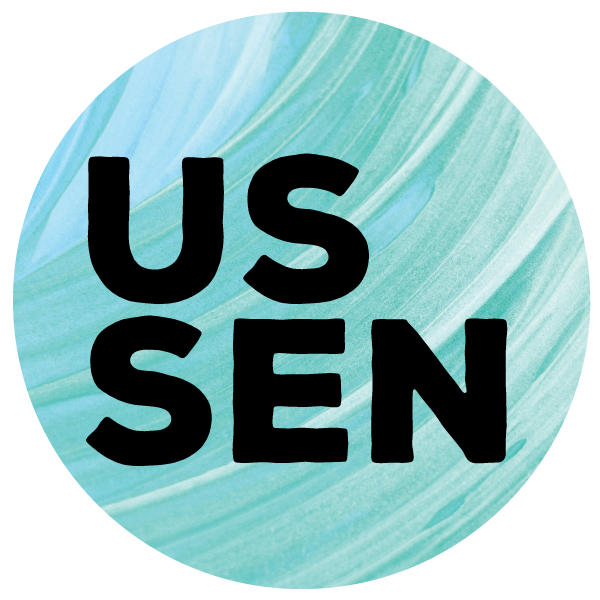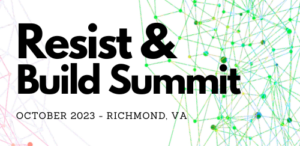USSEN is an anchor convener of the Resist and Build gatherings of trans-local U.S. solidarity economy groups; serves on the board of RIPESS which connects the global solidarity economy movement; participates in the Global Tapestry of Alternatives to build bridges between networks of alternatives around the globe; participates in the Democracy Beyond Elections Coalition to advance transformative participatory democracy; is a member of the New Economy Coalition, which includes 200+ U.S.-based members; and recently joined the Next System Teach-Ins Taskforce. Some of USSEN’s members recently formed the People’s Network for Land and Liberation to decommodify land and create resilient communities rooted in the idea of solidarity economy. USSEN also supports longstanding and emerging regional geographic solidarity economy networks, including MASEN and VASEN.
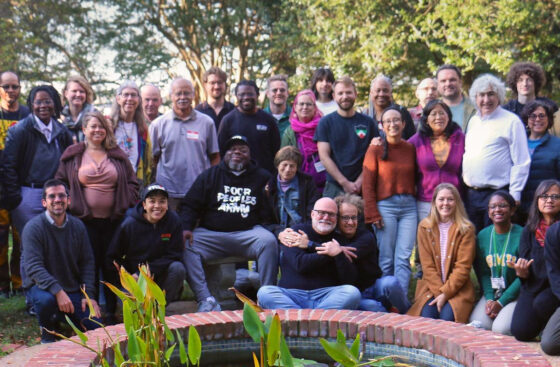
Resist and Build
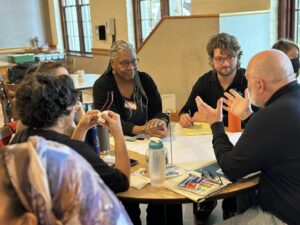 Convening the US SE Movement
Convening the US SE Movement
From 2020 to the present, USSEN has played a central role convening Resist and Build gatherings online, creating a space for translocal and national solidarity economy groups to engage in dialogue, build relationships, and collaborate.
In October 2023, USSEN helped organize an in-person gathering of the Resist and Build network in Richmond, VA, with some 75+ people in attendance. The most recent convening was online in March 2024.
The convenings model a productive dialogue around advocating for post-capitalism (as opposed to reforming capitalism); encourage ties among movements resisting oppression and those building alternative systems and institutions; and invite participating organizations to practice working together by working together.
Circles formed out of these convenings continue to meet today around critical efforts:
- The SE Narrative Circle highlights and documents strategic solidarity economy stories and various outlets for wider circulation;
- The Solidarity Economy 101 workshop series developed by the SE Education Circle has been held multiple times with hundreds of participants, including trainers in New Economy Coalition’s member education circle;
- The SE Politics and Policy Circle developed a candidate questionnaire about SE and organized resources about approaching electoral politics from an SE perspective;
- The Arts Culture Care and SE Circle co-convened with NEC continues to strategize ways to center art, artists and culture bearers in SE work, aligned with USDAC, Art.coop, and others;
- The SE in Academia Circle is exploring creating a SE syllabus and course plan for teachers.
If your organization wants to join a Resist and Build gathering, email us for more information.
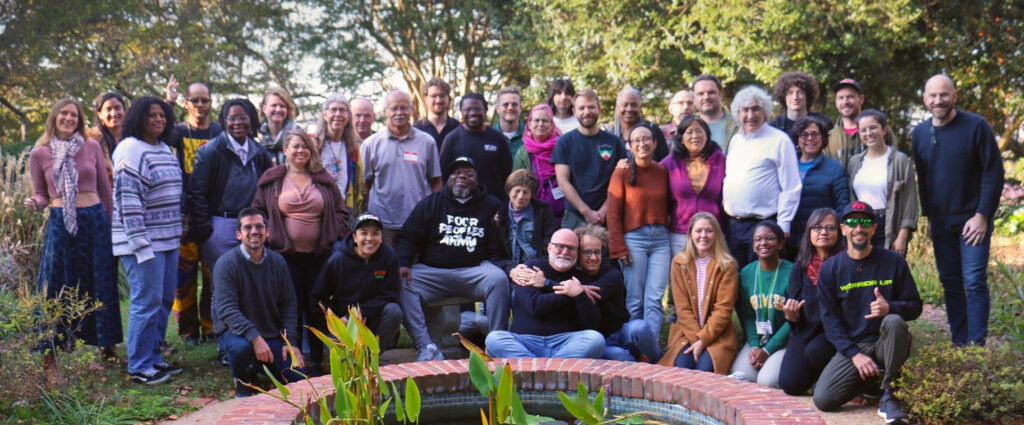
Rationale for Resist and Build – excerpt from the original invitation
“This is a critical moment in history. We face multiple crises: environmental, growing social, economic and political divides, and a slide toward fascism, economic instability and war. There is an urgency to both resist these trends, and to build an alternative system for a just and sustainable future. Resistance without a clear vision of the alternative, risks merely reforming the current system, while building the alternative without roots in movements of resistance, with leadership from those on the forefront of struggle, risks both being exclusionary to these folks and their communities, and being co-opted by reactionary/status quo forces. While there is a growing overlap between the resist and the build movements, there is still too much distance between the two.
“We look forward to exploring with others who seek system change:
- Why is it strategically important to connect these movements of resist and build?
- What are the opportunities to connect and amplify both resist and build while continuing to focus on our relative strengths?
“It is critical to think about Resist and Build in the context of system change. In turn, it is critical to continue to sharpen our analysis about what kind of system change we are talking about.
- “Where are organizations positioned with regard to capitalism? Can it be reformed or do we have to move to a post capitalist system if we are to achieve a more just a sustainable world? This is not about throwing stones but rather moving towards greater clarity regarding what system transformation we’re working for.
- “Solidarity economy is a big tent for approaches that seek post-capitalist transformation. At the same time, we believe that strategic alliances with those advancing a more humane and sustainable form of capitalism is important. We can take this opportunity to bring actors from both strands to sharpen our analysis and talk about opportunities to work together.
“Goals:
- “Articulate our collective position on connecting resist and build.
- “Sharpen the analysis of what system change we’re working for: post-capitalism vs. reform capitalism. Model a constructive dialogue about differences and aim to identify areas of collaboration/common interest.
- “Figuring out how to work together by working together eg. messaging on resist and build, strategizing and implementing concrete actions.”
To attend a Resist and Build gathering, email us for more information.
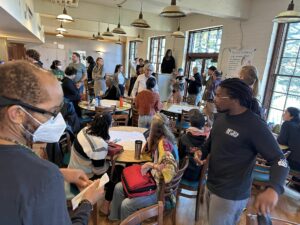
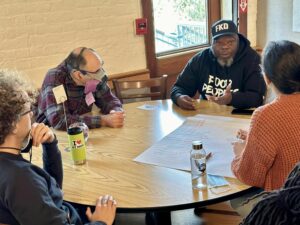
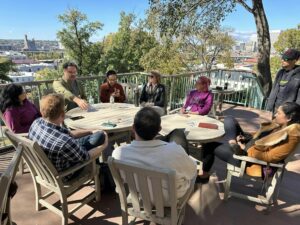
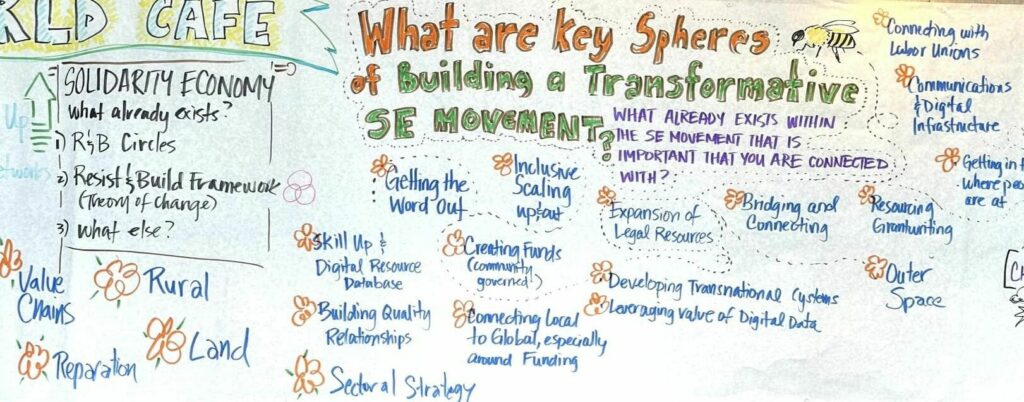
People's Network for Land & Liberation

The mission of the People’s Network for Land and Liberation (PNLL) is to decommodify the land to reestablish right relationship with the earth and all our relatives and relations. We aim to advance democratic ownership of the means of production and liberatory social relationships. We are committed to building communities that regenerate the earth’s lifegiving eco-systems.
PNLL consists of autonomous organizations that share best practices and opportunities to allow each entity to fulfill its organizational mission.
At the core of the network is a shared vision of how to create a new world.
A Shared Program
Through on-going conversation, members of the network found five key strategies for shifting from extractive systems to communities that are collectively created, self-sufficient, and resilient.
- Decommodify land using Community Land Trusts for community owned affordable housing and food production using a food sovereignty framework (also known as permaculture).
- Establish Community Production that employs digital fabrication technologies for decentralized manufacturing to empower local communities to create goods collaboratively and sustainably.
- Incubate an ecosystem of worker-owned cooperatives that go beyond “coops for the sake of coops” to create profitable and vibrant local supply and value chains.
- Incorporate an internal self-education program that engages folks to foster critical thinking, dialogue, and empowerment to learn and implement our transformational and liberatory program.
- Infuse Art and Culture activities in everything undertaken. This includes making things beautiful, but goes deeper. We organize according to the adage “If it isn’t soulful, it isn’t strategic.”
 Each organization has different experiences and a distinct perspective on the points of the program. And the program itself continues to evolve.
Each organization has different experiences and a distinct perspective on the points of the program. And the program itself continues to evolve.
The Network
 The People’s Network for Land & Liberation is made up of six organizations.
The People’s Network for Land & Liberation is made up of six organizations.
Each is rooted in place. Each is addressing the immediate needs and opportunities in their communities. Each is creating possibilities for resilience and self-sufficiency.
Together, they show what a new world could look like and how it could work.
Imaginal Cells

A metaphor: As a caterpillar’s body disintegrates inside its chrysalis, clusters of cells, called imaginal cells, begin to form a butterfly. The caterpillar’s immune system attacks them, but eventually they trigger new cell division, multiplying and combining to form the new body. Soon, the butterfly emerges and takes flight.
The partner organizations of the People’s Network for Land & Liberation are like the imaginal cells, pointing the way toward the transformation.
>> Read: Goddard College For Sale: A Future Just Transition Campus
Global Tapestry of Alternatives

The Global Tapestry of Alternatives (GTA) is an initiative seeking to build bridges between networks of alternatives around the globe and promote the creation of new processes of confluence.
There is an increasing emergence and visibility of an immense variety of radical alternatives to this dominant regime, contesting its roots in capitalist, patriarchal, racist, statist, and anthropocentric forces.
These range from initiatives with a specific focus like sustainable and holistic agriculture, community led water/energy/food sovereignty, solidarity and sharing economies, worker control of production facilities, resource/knowledge commons, and inter-ethnic peace and harmony, to more holistic or rounded transformations such as those being attempted by the Zapatista in Chiapas and the Kurds in Rojava. Alternatives also include the revival of ancient traditions and the emergence of new worldviews that re-establish humanity’s place within nature, as a basis for human dignity and equality.
In this context, GTA is a process, led by people of the global majority (i.e. non-white) people of the global south, who work to connect grassroots alternatives. GTA is a “network of networks.” Each of those networks acts in different parts of the planet by identifying and connecting Alternatives. They are the Weavers.
In 2024, USSEN helped GTA establish a Solidarity Economy working group, which convenes SE weavers from around the globe regularly to share knowledge and explore collaborations.

RIPESS
 RIPESS is an intercontinental network of continental networks committed to the promotion of Social Solidarity Economy (SSE). The member networks themselves (Latin America and the Caribbean, North America, Europe, Africa, Asia and Oceania) bring together national and sectorial networks like USSEN, thus ensuring strong territorial anchoring. The combined local and global scope gives RIPESS legitimacy to promote SSE, foster intercontinental cooperation, and advocate at different levels.
RIPESS is an intercontinental network of continental networks committed to the promotion of Social Solidarity Economy (SSE). The member networks themselves (Latin America and the Caribbean, North America, Europe, Africa, Asia and Oceania) bring together national and sectorial networks like USSEN, thus ensuring strong territorial anchoring. The combined local and global scope gives RIPESS legitimacy to promote SSE, foster intercontinental cooperation, and advocate at different levels.
The inherent nature of RIPESS includes the objective of contributing to systemic, transformative change. It does this by demonstrating how much SSE contributes in terms of real transformative answers at local level to the existing system that is clearly showing its limits. RIPESS members believe in the importance of the globalization of solidarity, and the ability to build and strengthen an economy that places people and planet at the center of its activities.
The network organizes gatherings and educational events aimed at sharing knowledge across the globe and advocating for policy that supports and expands SSE.
RIPESS was established in 1997 in Lima, Peru. USSEN joined after its founding at the 2007 US Social Forum.
Democracy Beyond Elections
The Democracy Beyond Elections coalition is dedicated to transformative participatory democracy rooted in community-led decision making that is accessible, equitable, and significant. We envision a world where people have direct decision-making power over the issues that affect their lives.
The coalition was originally convened in 2021 by the Participatory Budgeting Project and is made up of a robust set of partner participants, including USSEN.

Goals and Activities
DBE aims to increase the quantity and quality of government programs that engage community members in civic engagement and democracy beyond elections, at the local, state, and federal level.
- Build Partnerships & Collaboration
- Develop Campaign Strategy
- Secure Commitments to Implement Participatory Democracy
- Launch & Evaluate Pilot Programs
Community -Led Recovery Program
The DBE coalition launched an RFP to distribute grants to organizations using participatory democracy practices to distribute ARPA funds in their community.
These organizations have been working to advocate for and implement participatory practices in the allocation of American Rescue Plan Act (ARPA) funding. Each organization received $10,000 to carry out their work, in addition to shared learning and capacity building opportunities.
Learn more about what these organizations have accomplished!
Learning Materials
DBE also created materials to help educate people about Participatory Democracy and Participatory Policy-Making.
New Economy Coalition

The New Economy Coalition is a membership-based network representing the solidarity economy movement in the United States, a coalition of 200+ organizations showing that another world is not only possible — it’s already happening. NEC organizes members into a more powerful and united force, in order to accelerate the transition of our economic system from capitalism to a solidarity economy.
NEC’s members are a cross section of nonprofits, mission-driven businesses, grassroots community organizations, and sectoral associations. While many groups are focused on a particular strategy or are based in a specific geographic region, they join NEC to be part of a network that is cross-sectoral and national in scope.
USSEN is a member of NEC and three of USSEN board members were elected by the NEC membership and currently serve on the NEC board.
NEC supports a just transition from an extractive to a regenerative economy by building the scale and power of the solidarity economy movement in Black, Indigenous, and working class communities in every region of the United States.
NEC offers the following resources that may appeal to non-members as well as members:
New Economy Roundup – bi-weekly newsletter highlighting the work of our 200+ members and many other building just and sustainable economies around the world
Solidarity Economy Funding Library – a resource for people to find funding, investing, and fiscal sponsorship opportunities, as well as detail relationships between movement organizations and funders.
Network Resource Library – featuring resources from NEC’s 200+ members.
MASEN
The Massachusetts Solidarity Economy Network (MASEN) is a statewide coalition and community, building regenerative and reparative, post-capitalist futures across the Commonwealth. MASEN aims to strengthen solidarity economy through shared vision, education, trust-building, relationships, collaboration, and infrastructure. In every county of the Commonwealth, communities are finding ways of doing “economics” (creating and sharing value) that are rooted in cooperation, trust, justice and care, not in capitalist ideals of private property, individualism and wealth accumulation.

VASEN
The Virginia Solidarity Economy Network (VASEN) supports, educates, and connects people striving to build a more resilient and equitable economy based on shared values.
VASEN is a growing network of grassroots organizers focused on building an economy that seeks to overcome the crisis of capitalism by rooting itself in the history of Black and Indigenous ancestors and realizing the values of democracy, sustainability, equity, solidarity, and pluralism.
VASEN offers:
- Listserv and Zulip communication channels to keep the conversations going
- Learn-Ins about the solidarity economy with a purpose of networking
- Book Club meetings on the history of solidarity networks and worker cooperatives
Next System Teach-Ins Taskforce
The Next Systems Teach-ins Taskforce is meeting to plan a series of teach-ins across the world over the next three years, highlighting the need for transformative systems change. Stay tuned for more info!
